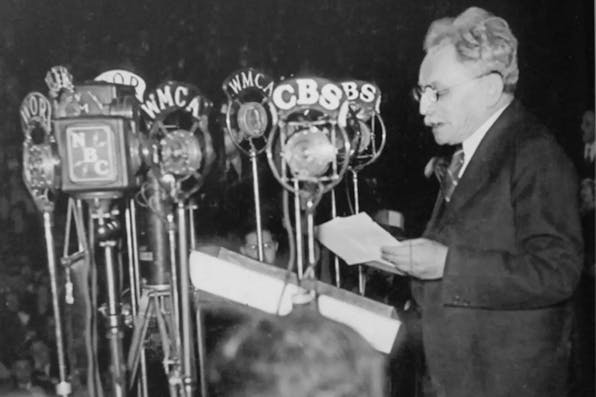
March 1, 2024
To Do Better in Our Time, We Must Learn What Abraham Cahan Accomplished in His
Yiddish socialist or proto-neoconservative?
How fortunate that my essay on Abraham Cahan should have quickly achieved its primary purpose of getting us to think again about the man, his work, and his influence. Two historians enrich our discussion from their own valuable perspectives—Rick Richman as part of his ongoing studies of Zionism and portraits of Zionist leaders, and Gennady Estraikh, a specialist in Soviet Jewish history, by tracking some of Cahan’s political shifts in response to changes in Soviet, Jewish, American, and world affairs.
Richman’s account of the 1940 Madison Square Garden rally of the Workmen’s Circle brings alive Cahan’s pivotal role as anti-Communist and American patriot who called for America’s entry into the war against Hitler. Estraikh’s critical judgment of Cahan—“not a prescient political leader,” “sharp observer rather than a deep thinker,” and hugely disliked by professional and political rivals—makes the case for Cahan’s outsized influence from the negative angle of how much disapproval he faced down during his almost half-century of editorial rule.
Estraikh casts Cahan as a kalter Litvak. As a bit of a cold Lithuanian myself, I appreciate some of that quality in a writer and thinker, but Cahan was also the man who translated into Yiddish Leo Tolstoy’s Kreutzer Sonata—a novel censored in its time for its sexual passions and its apparent exoneration of a husband who is his own Iago. Cahan’s favorite writer was Chekhov, and his friends among the American writers and journalists thought of him as the warm-blooded Russian. In the style of the Russian intelligentsia, he did much of his political and social thinking through the writing of fiction. Another American Jewish writer, George S. Kaufman, once quipped, “One man’s Mede is another man’s Persian,” and so too with the reputation of Abraham Cahan.


